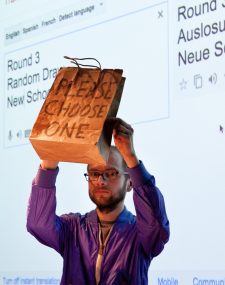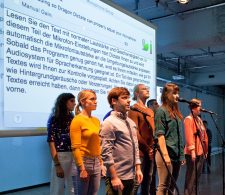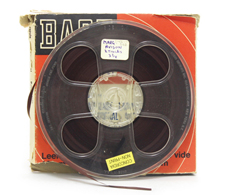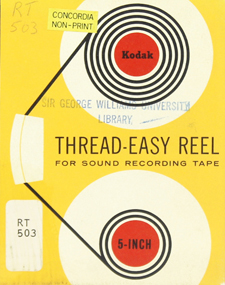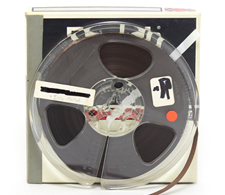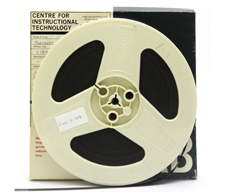Christine Mitchell is a writer and researcher based in Toronto. She's working on a manuscript that develops a media theory of translation through examination of language laboratories, machine translation, translation bureaus, and gamified language learning. Most recently, she's held postdoctoral positions in the Department of Media, Culture and Communication at New York University and with SpokenWeb, a digital spoken word archive for literary research, in the English Department at Concordia University.

Authors | Christine Mitchell
Articles on Amodern by Christine Mitchell
AMODERN 8: TRANSLATION–MACHINATION
Amodern 8 explores the contexts and implications of translation as mechanism, media, technique, and transmission. Our tethering of “translation” to “machination” marks our intention to move beyond the habit of situating MT and computer-generated language in the familiar crisis poses of fakery, treason, and inauthenticity. Rather than regarding the machine as marking the limits of translation – an assumption that risks walling off translation practice from media and communication studies concerns, while still absorbing its products – our aim is to continue to investigate the possibilities and configurations of translation as machined, and translation as machining meaning, historically and in the contemporary moment.
Because “translation” can so easily be used metaphorically as a way to theorize all manner of signal recordings and transmissions, the term forsakes some of its practical solidity as attention shifts away from translation-as-it-happens to other media, other technologies, and other concerns. The metaphorical borrowings apply not only to translation, but to language as well. While it can certainly be generative to expand the translational scope to other media transformations, for the purposes of this special issue we have chosen to retain the more precise usage. In sum: we simply still care about language as a particular kind of medium – and in our contemporary computational environments, questions about what language is, how it moves, and how it is used, manipulated, maintained, transformed, and understood seem more pressing than ever before.
Our contributors grapple with such machinations by revisiting, uncovering, and extending machine translation’s historical record; by close reading translations, not primarily or only as hermeneutic inquiries, but as analyses of process and procedure; and, in a similar vein, by (re)activating machine translation development and operation through prototyping, re-creating, and experimenting with its devices and programs.
WHETHER SOMETHING WORKS
Finding the Human in the Margins of Machine Translation
The success of statistical methods for computerized translation is often recalled as the victory of empiricist data analysis over rationalist rules-based approaches. The new methods just “worked.” This paper adds nuance to historical claims by revisiting events that dramatized the methodological opposition. What’s uncovered is the human in the machine loop of translation; while new assessment practices paved the road to technological success, they were justified by the paradoxical expectation that human language learning would underwrite machine translation functionality.
CAN YOU HEAR ME?
Excerpts from The Poetry Series, 1966-1974.
AMODERN 4: THE POETRY SERIES
As digital migration and networking broaden the territory, possibilities and forms of humanities scholarship, audio recordings of literary performances present a rich new area for critical inquiry. The poetry reading series, as a literary and performance genre and temporal entity, demands special emphasis as it resists straightforward classifications and modes of presentation. How can we approach, understand and engage with “the poetry series” as a discursive formation, a historical occasion, and as a literary subject as we encounter it through a variety of print and sound media artifacts? This special issue of Amodern interrogates the poetry series by orienting a range of critical, archival, historical and creative interventions around a single poetry series from the 1960s and 70s. That event, called “The Poetry Series,” was originally preserved on a collection of reel-to-reel tapes and has recently been digitally re-animated as SpokenWeb, a digital spoken word archive for literary research. Individual contributions to this issue are episodes in critical, historiographic and creative framing, a means of rendering the poetry series – an ephemeral program of events – discernible again in the present. Taken together, this issue of Amodern makes an argument for an expanded literary historical critical practice that considers the challenges of migrating literary cultural artifacts and media to digital formats, that registers the specificities of a distinctly audiotextual criticism, that confronts the benefits and risks of recognizing poetics as media poetics and literary histories as media and institutional histories, and that assembles new communities of scholarly practitioners in an effort to understand this manifestation of literary performance, including literary and cultural critics, digital humanists and designers, archivists, librarians, audience members, sound technicians and oral historians.
MEDIA ARCHAEOLOGY OF POETRY AND SOUND
A Conversation with Shannon Mattern
Shannon Mattern’s broad-ranging media archaeological research and teaching attend to textual and literary spaces, sound archives and the materialities of media migration and transformation. This conversation alights on Mattern’s experience and insight and offers an indispensable entreé to the pleasures, risks, stakes and meanings of media historical investigation and hands-on archival work for literary and performance scholars confronting their objects of study as media artifacts. Addressing the practicalities and problems around archival research and archive building, Mattern charts the territory and signals key debates for newcomers to media archaeological ventures with respect to what sound and media archives mean, and the ways we encounter and create them.
AGAIN THE AIR CONDITIONERS
Finding Poetry in the Institutional Archive
While the reel-to-reel tapes that preserved the SGWU Poetry Series can rightfully be considered literary artifacts, this paper explores their conditions of existence as instructional media productions. Archival research and interviews reveal that recording was overseen by a centralized campus media unit using equipment belonging to the university’s language laboratories and post-production routines oriented around materials for laboratory use. In examining the effects of media-pedagogical trends, staff routines, commitments, know-how and changing administrative priorities on the care and survival of the tapes at the micro level, the paper foregrounds a macro-level argument regarding the agency of institutions and their personnel in constructions and relations of mediality and literariness.




